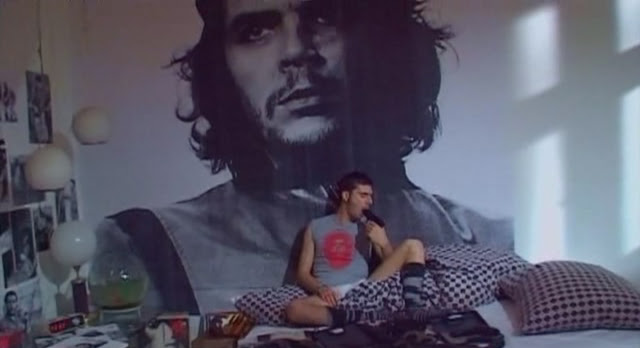First Wave of the New Queer Explicit Movement, including the definition of the movement, can be found here
The Return of Conservatism
After Leather Jacket Love Story, sexuality in queer films stayed out of serious queer cinema. At first, the films portrayed sexuality in complicated, not positive manners. Bruce LaBruce’s 1999 film Skin Gang, was a co-production with the Cazzo porn studio. It explored the line between fetishism and fantasy, guilt and acceptance, rape and consensual sex, and was more regressive in its depictions of sexuality than what had come before it. The film was released in two versions, an edited and a hardcore version, with the latter being 20+ minutes longer for a total of 88 minutes in length.
In 2000, Portugal gave us O Fantasma, a film of gay obsession and fetishism where sexuality was explicitly tied to kink and tied to a character’s sanity, or insanity as it were. For the first hour, O Fantasma treats us to increasing states of eroticism and obsession, until it takes a final act turn where the protagonist turns into a rubber dog, urinates and defecates in a junkyard, and drinks from puddles. What O Fantasma is ultimately saying, I’m still not sure. But, it waffles between celebrating and punishing homosexuality.
Larry Clark’s 2002 semi-queer film Ken Park was probably the epitome of the sex negativity, which wanted to show explicit sexuality while simultaneously condemning it. It opens and closes with the same suicide, and engages in frequent non-consensual and abusive relations, including incest and masturbation.
If the films weren’t being sex negative, then chances are they were promising more sexuality than they actually delivered. 2001’s film The Fluffer, for instance, banks on being a pseudo-expose of gay porn sets, a counterpoint to Boogie Nights, but fails to deliver on the sexuality it promises. 2002’s American film Woman on Top teases us with a variety of queer sexualities, including transgendered behaviors, but ultimately fails to deliver on the goods. Similarly, 2003’s Mexican film Y Tu Mama Tambien promises the homoerotic behaviors of two best friends as they fall in love. They celebrate their love in a semi-explicit threeway with an older woman, but final act breaks them apart as they fall prey to their own guilt about their behavior.
Second Wave (2004-2006)
The smaller second wave of films of the New Queer Explicit Movement, is far more politically motivated than the first wave was. The first wave was all about radically coming back to ourselves, by bringing in a healthy sexuality. AIDS meds had finally started working, death wasn’t knocking on the doorstep nearly as hard, and there was an urge to bring sexuality back to our lives.
The second wave would be defined by mashing sex and politics together to create statements aimed at both gay and straight audiences about the oppression of conservative thoughts and behaviors. Both heterosexuals and homosexuals have been oppressed by a puritanical sensibility, and these films sought to try to destroy those walls, and radicalize the benefits of guilt-free indulgences.
This wave celebrated sexuality in its various forms. It celebrated kink. And, even as it was politicizing all sex, it was also demystifying it and making all the sex plain, a radical idea. The idea that unifies these three movies is that sex is as radical as it comes, and yet it is also as old as time.
 The Raspberry Reich (2004)
The Raspberry Reich (2004)
Continuing his contract with Cazzo Studios, the German gay fetish porn company, Bruce LaBruce created The Raspberry Reich, a movie which took on the stylings of Godard’s new wave political films and melded them with hardcore gay pornography. In some countries, The Raspberry Reich was edited for their version of the R-rating, but then had the hardcore pornography added back in for a version retitled The Revolution is My Boyfriend.
With The Raspberry Reich, LaBruce further developed his renegade style that would be a self-consciously pornographic film which felt like John Waters came back from his safer films and directed straight up porn made in the style of Pink Flamingoes. Both films are pointed films aimed at the auspices of good tastes, but LaBruce is also making some sort of statement about revolutionary statements on top of it. He has made a film which is just as ridiculous as it is political.
The fun part of The Raspberry Reich is that it ends up being a celebration of gay sexuality, with naked men putting guns into their mouth, or full on oral and anal intercourse. Cazzo, a gay German fetishistic porn studio, required LaBruce’s films to have some degree of hardcore pornographic sexual depictions in order to stay within the studio flavor. LaBruce’s output defied the usual pornographic descriptions as he filled his films with images such as giant wall prints of Che Guevara, or statements like “Heterosexuality is the opiate of the masses.” These statements feel much like the famous speech Divine gives in Pink Flamingoes advocating murder, or when Edith Massey tries to convince her son to go gay in Female Trouble by telling him “The world of heterosexuals is a sick and boring life!”
While LaBruce is making fun of everything under the sun, he simultaneously indulging in those same things. By indulging as it mocks, The Raspberry Reich never diminishes the joy of the sex on screen, nor does it condemn it. Instead, LaBruce, once again, revels in the sex even as he politicizes it. Sex is a definite part of human life, and it can have a lot of meanings. I once read that some queers in the 70s used to feel that anal sex and fisting in the bathhouses felt almost revolutionary as if they were actually taking one for freedom. LaBruce indulges in those feelings, even as he mocks their silliness.
 A Dirty Shame (2005)
A Dirty Shame (2005)
Speaking of John Waters, in 2005, he would release his (as yet in 2014) final film, the NC-17 sexual extravaganza A Dirty Shame, where he celebrates every dirty sexual act he can think of. A Dirty Shame tells the story of a battle between the neuters and the perverts over a neighborhood’s moral compass. Sylvia Stickles is a member of the neuters, along with her husband and her mother. When Sylvia is knocked on the head, suddenly she turns into a sex addict who gets off on oral sex, and must fulfill her destiny to create a new never-before-seen sex act in order to release the pressures of society.
Sylvia is brought into the fold by Ray-Ray, a “sex saint” who shows her the wide variety of sexual perversions from sploshing to the homosexual bear fetishism. While A Dirty Shame is largely a heterosexual movie, John Waters is undeniably a homosexual man, and A Dirty Shame‘s intentional camp value adds to it’s queerness. Given that the funniest and most insightful moments happen whenever the bears are on screen, John Waters might have done better by sticking with a deeper blend of homosexuality and heterosexuality on screen.
Regardless, it is fairly obvious that Waters sides with the perverts, as he is most definitely one himself, and celebrates life’s fetishes in all of their glory. He believes that sexuality should be celebrated and not condemned. And, he wishes people would realize that what people do in their own lives is actually nothing to be shocked about.
 Shortbus (2006)
Shortbus (2006)
The less sassy edition of A Dirty Shame is in 2006’s Shortbus, a film about all sexuality saving the emotional lives of a few damaged people. John Cameron Mitchell, the director of Shortbus had stated that sexuality is a joy in life, and it shouldn’t be hidden or covered over in cinema. In American cinema, we show too much negative sexuality, if we show it at all. Mitchell’s film attempts to show human sexuality in all its rawness, from being damaging to pleasurable to funny to erotic to perverse to…everything.
Mitchell follows 2 couples as they deal with their own personal emotional wreckage. The first is a gay male couple where one is secretly making a suicide note video that includes him giving himself a blowjob, and the other just wishes they could all be happy. The second couple is a sexual powerhouse male and a sexually demure female who hasn’t had an orgasm, but is actually a sex therapist.
Both couples end up at an apartment/club called Shortbus, where Justin Vivian Bond, a genderqueer renegade, holds court over everybody as they are free to discover their own sexuality ranging from partner switching to experimentation to voyeurism to whatever. The morality of Shortbus is that if it is consensual, it’s OK. And, really, you should just go with it.
The depictions of sexuality are varied and explicit from the opening scene which intercuts the hetero couple having wild sex in a multitude of positions all around a bedroom with the aforementioned self-video creation of auto-oral stimulation. Eventually Mitchell would include an analingus rendition of the national anthem, orgies, and a variety of fetishes in moderately explicit order.
Mitchell’s film is just as political as LaBruce or Waters, the politics of Shortbus aren’t to possess the film with a more satirical edge, but to fully embrace the emotional power of human sexuality and try to bring the acts back from their place of shame into a regular part of our human psyche. The sex may not be depicted as frequently nor as perversely as you may actually imagine from this review and from others, but that’s because Mitchell is making a human story that wraps up explicit sexuality into its core.


